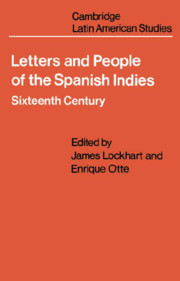Part III - officials and Clerics
Published online by Cambridge University Press: 06 August 2018
Summary
Oh sacred majesty, how just and good are the royal orders you send to this province, and how officials mold them here and do what they wish!
Bernal Diaz del Castillo, Guatemala, 1552
Letters from governors and prominent ecclesiastics fill the great Archive of the Indies. They were, for reasons not unrelated to the relative legibility of their script, among the first documents to interest Spanish American historians; consequently they dominate the documentary collections of the nineteenth century, and are second only to the chronicles of the conquest in familiarity.
Despite this popularity, the governors’ letters, directed usually to the king and royal council, are among the least informative writings of man. They magnify small problems and hide large ones; they denigrate the actions of predecessors and represent routine procedures as important policy innovations; they give the weight of official truth to uninformed gossip, malicious stereotypes, and superficial observations. Letters from judges, treasury officials, bishops and friars share many of the same characteristics, with the addition of constant highly colored criticism of the governor and of each other, as almost institutionalized rivals.
We include some examples of this type of public official correspondence because it was a part of the cultural life of the time. If one gets a notion of the conventions of such writing and the types of motivation underlying it, one can gain from it considerable knowledge concerning the correspondents’ mentality and stance, and learn at least something about general conditions. However, in these letters one learns very little indeed about officials and clerics’ manner of operation, a phenomenon of an altogether different level. Affected very strongly by considerations of region, family, social position, economic necessity and group rivalry, officials in real situations perforce acted differently than might seem to be dictated by royal decrees or their own public pronouncements. To give some sense of this, we also include several private letters from the holders of various types of office. When talking to relatives and friends rather than to the king, they touch a different subject matter, are much franker, and reveal profound similarities to other settlers. The institutions use the same methods as the society in which they are immersed, and they reflect it perhaps more than they shape it.
- Type
- Chapter
- Information
- Letters and People of the Spanish IndiesSixteenth Century, pp. 173 - 174Publisher: Cambridge University PressPrint publication year: 1976



